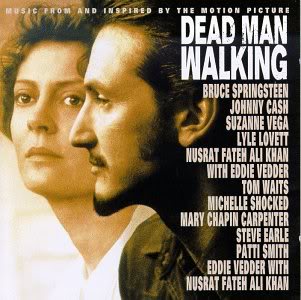During my first year at BGSU, I saw two motion pictures within a span of nine months that shook me to my  core. When I entered college I thought I was in touch with my faith, even considering the possibility of becoming a minister. Movies won out, though.
core. When I entered college I thought I was in touch with my faith, even considering the possibility of becoming a minister. Movies won out, though.
As school began in the fall of ’88, I was home one weekend and drove to downtown Cleveland and crossed a picket line to see The Last Temptation of Christ, Martin Scorsese’s groundbreaking adaptation of Nikos Kazantzakis’ controversial novel. The film was just as controversial as it was denounced by religious groups for, among other things, its portrayal of a final temptation by Satan to Jesus while he’s near death on the cross. Satan proposes that Christ come down from the cross and when he does, he will experience life as a man: a wife, children, and sensual pleasures. This last bit was the most controversial part as Jesus was seen making love to his wife, Mary Magdalene. Jesus refuses the devil’s temptation and ascends into heaven.
This vision of the final temptation was not what affected me so deeply. Instead, it was the sight of Jesus, so beautifully portrayed by Willem Dafoe, struggling with his conscience, weak, and questioning his own faith and sanity. For the first time in my life, I saw Jesus not as a walking, talking deity who performed miracles and offered proverbs, but as a man, with all of the flaws that come with being a human being. Thanks to Scorsese’s picture, I questioned the lessons I was taught (and believed) as a child, some 16 years of Sunday school. Jesus as the son of man, as well as the son of God, had never been clearly explained. I don’t want to say that I felt betrayed, but I was deeply troubled.
When the school year ended, I returned home to my parents’ house, to the same job I’d worked the previous summer, and to the same routines I’d had before my first taste of independence at college. One of those routines was attending church, which felt like I was going through the motions instead of receiving inspiration. That June I watched Peter Weir’s film version of the Paul Theroux novel, The Mosquito Coast. In this powerful, meditative movie, River Phoenix stars as a young man uprooted with the rest of his family by his eccentric, inventor father, Allie. The father is convinced that society is about to collapse, that nuclear annihilation is inevitable. He and his family build a new life among the natives in Central America, with Allie slowly losing his mind.
Harrison Ford portrays Allie, in what may be his finest performance as an actor. His acting is magnetic. The jolt he gave Allie’s rants against society and organized religion, in particular, were startling and stuck to me like the remnants of an old caramel lodged in my teeth. For the remainder of my four years in college I grappled with my faith, my mind restless with questions about the church and God. My mind seemed to settle when I met Julie in 1992.
It felt like destiny. Indeed, whenever I reflect on the series of events and relationships I went through to wind up working at the same produce store as she was, I continue to believe that something greater than mere coincidence that brought us together. And for a while, I was able to sustain my spirituality. Although I did not attend church regularly, I found comfort in the quiet of the night when I could pray; and I found inspiration in the lyrics and music of such artists like Bruce Springsteen, Bob Dylan, Patty Griffin, and U2. Moreover, as I pursued a career in film, I continued to turn to the movies to give me insight. It was through the movies that I first heard Eddie Vedder’s gorgeous “The Long Road,” his contribution to the film and soundtrack of Dead Man Walking, the haunting film adapted and directed by Tim Robbins, based on the book by Sister Helen Prejean.
If you’ve never heard “The Long Road,” pause now to listen to it. Notice the intricacies of the guitar playing by Vedder and Ry Cooder, how it lays the foundation for the rest of the sparse instrumentation — a dumbek, a harmonium, and a tabla. Hovering over the proceedings are the otherworldly vocals of the late Nusrat Fateh Ali Khan, backed by Farrukh Fateh Ali Khan and Rahat Ali Khan. If you’re only familiar with Vedder as the passionate lead singer of Pearl Jam, you may be surprised at his angelic, soulful singing and the beauty of this hymn he’s written. Its mixture of Americana and Middle Eastern music is transcendent.
In the past eight years I’ve been questioning my faith again. I should be thankful that Jacob is healthy, that the medicines he sucks into his lungs each day and the regiment of pills he takes each night are helping him. There are other cf families, families in situations worse than ours, families who should be as angry and sad as I am; these families all have stronger faiths. Why can’t I let go of these emotions that cloud my heart and block the embrace of a higher being? Like the lyrics in the song, I think to myself, ”I have wished for so long/How I wished for you today.” Could it be that the questions that shook me to the core 20 years ago were never fully answered? Will I always be waiting for a response to my ”why?” I’ll keep searching, hoping that someday the truths I seek will come to me and this burden will lift.
Until that time, I’ll continue down the long road, with my family by my side, and music to guide me.


![Reblog this post [with Zemanta]](http://img.zemanta.com/reblog_e.png?x-id=a17d6c0f-3112-4b0d-a984-f5c081b73562)



Comments